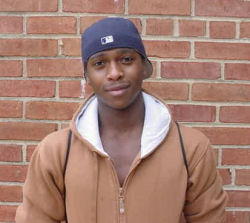I distinctly recall the sweet sensation I experienced
when first looking upon Ghana.
Everything was original and completely unlike anything I had ever witnessed
while in Maryland, or America for
that matter. The dirt roads, for instance, were completely foreign, decorating
the entire city of Accra, the national capital, until
finally merging with the countryside, giving me the idea that Ghana was
made exclusively of sand and soil. This impression was regularly enforced
by passing villas, untidily swathed in dust, and the myriad locals, who I
presumed mistook sand for water, thus accounting for the excessive amounts
of dirt that disguised their body, as if clothing.
Eventually, I learned that some Ghanaians
were exceedingly poor and could not expect the daily showers that I was accustomed
to. This
realization came to me through a fellow student, whose name was Phillip,
while attending third grade in S.O.S, a Ghanaian school located in the Tema
region. “Phillip, why is your uniform always covered in dirt, don’t you wash?” I
teased. “Ah, you American boy, think you so rich, who the hell do you think
you are talking to?!” spat Phillip. The intensity of his voice was staggering,
for I seldom witnessed Phillip shouting. His voice was generally soft, yet
clear, with an air of authority that suggested self-confidence. Obviously,
I had insulted him; however, I failed to recognize the cultural significance
of my remark. Regrettably, Phillip, who at the time was my only friend, ceased
to speak to me, thus making my experience in S.O.S considerably less enjoyable.
Recently, roughly one year ago, I returned to Ghana and
was immediately faced with a sense of déja-vu, realizing some things had
not changed. The same dirt roads obscured the natural soil that essentially
devoured Ghana and
was populated by identical natives, covered with the same muddy attire. However,
age had compelled me to recognize the hundreds of beggars and tramps haphazardly
littered across Accra, as if
useless junk, collectively ignored by the few wealthy passersby. Journeying
across Ghana,
I was routinely swamped by homeless children, utterly vulnerable and desperate
for food, money, or even adoption. Indeed, I was quite disturbed by the seemingly
limitless poverty that infected Ghana,
my country, sucking dry its beautiful landscape like one giant AIDS disease.
The once magnificent countryside, previously submerged with colossal plant
life and gorgeous, dark green pasture, was rudely replaced with withering,
yellow grass fields, ultimately festering into dying weeds. Only the handsome,
cloud-filled, sapphire blue sky remained, which cruelly mocked the desolate,
barren sand pit, formerly Ghana.
Sweat mercilessly drenched my pasty,
white Sunday shirt as I endured an unreasonably long Ghanaian sermon, commemorating
the death
of a former Ghanaian politician, whose name I can no longer recall. Understandably,
my attention was especially limited due to an unusually steaming temperature,
and uninspiring preacher, who clearly was Catholic. In addition, I was
forced to accompany my remarkably stupid, 13 year old,
cousin, whose name surprisingly is also Amartey, although I constantly
refer to him as “Baby Amartey.” Obviously, I was irritated,
furiously contemplating the logic in my attending a memorial service for
a man I previously thought never existed, but was forced to stare lifelessly
at an ivory statue delicately crowned with golden locks, who I assumed represented
Mary. Ultimately, the service was concluded to accommodate the many rumbling
stomachs, also weary of the preacher’s monotonous sermon. Mercifully, refreshments,
consisting of corn beef sandwiches and meat pies, were provided after the
memorial service.
Ironically, the memorial service was traditionally
followed by an outdoor party, hosted by an extremely wealthy Ghanaian, also
a politician,
who served as chief advisor to the Ghanaian president. The transition between
funeral and celebration essentially served to commemorate those still living,
and is among the most outlandish parties I have ever experienced, incorporating
thousands of dances, chants, and competitions prepared by the wealthy youth,
fortunate enough to obtain invitation. Truthfully, I normally dislike huge,
luxurious parties that require a tux, however the prospect of reuniting with
past friends, also wealthy enough to attend, proved irresistible, forcing
me to rent a rather expensive “Sunday suit.” The money spent, however, was
soon disregarded, uncaringly trampled by the thousands of dancers, graciously
synchronizing their movements with the much-loved African guitarist, whose
melody forced even the crippled and elderly into a rhythmic footstep. Life
was great.
Hours later, I lay rested on the soggy,
undoubtedly pampered green grass, utterly exhausted and accompanied by an
old friend, Ebow, who
was a fellow student during the third grade. All rhythm and composure had
escaped, hidden among the steamy night air, hot from the collective candle
fire and body heat of remaining dancers. During this time, Ebow, my friend,
asked me an interesting question, which I will always remember. “Amartey,
are you Ghanaian or American?” breathed Ebow, still drained from dancing
the entire night. “What?” I responded.
The question startled me, for Ebow seldom referred to me as a Ghanaian. Throughout
third grade, I was notoriously referred to as “that American boy,” who deserved
neither respect, nor recognition for my Father, who was born and raised in Ghana. “Ah,
are you American or Ghanaian?” pressed Ebow, whose voice was becoming increasingly
annoyed due to my inability to answer such a simple question. He failed to
recognize the significance of his question and the moral decision he demanded
of me. In essence, I had the option of rejecting 15 years of my life, and
the association I felt towards America,
or my father’s heritage, a country currently devastated with poverty, but
still the place I mostly identified with. Five seconds, unkindly filled with
unbearable tension and anxiety, passed before I made my decision. “Both.” I
replied calmly.
Tell us what you think.
E-mail lassogmhs@hotmail.com
|


